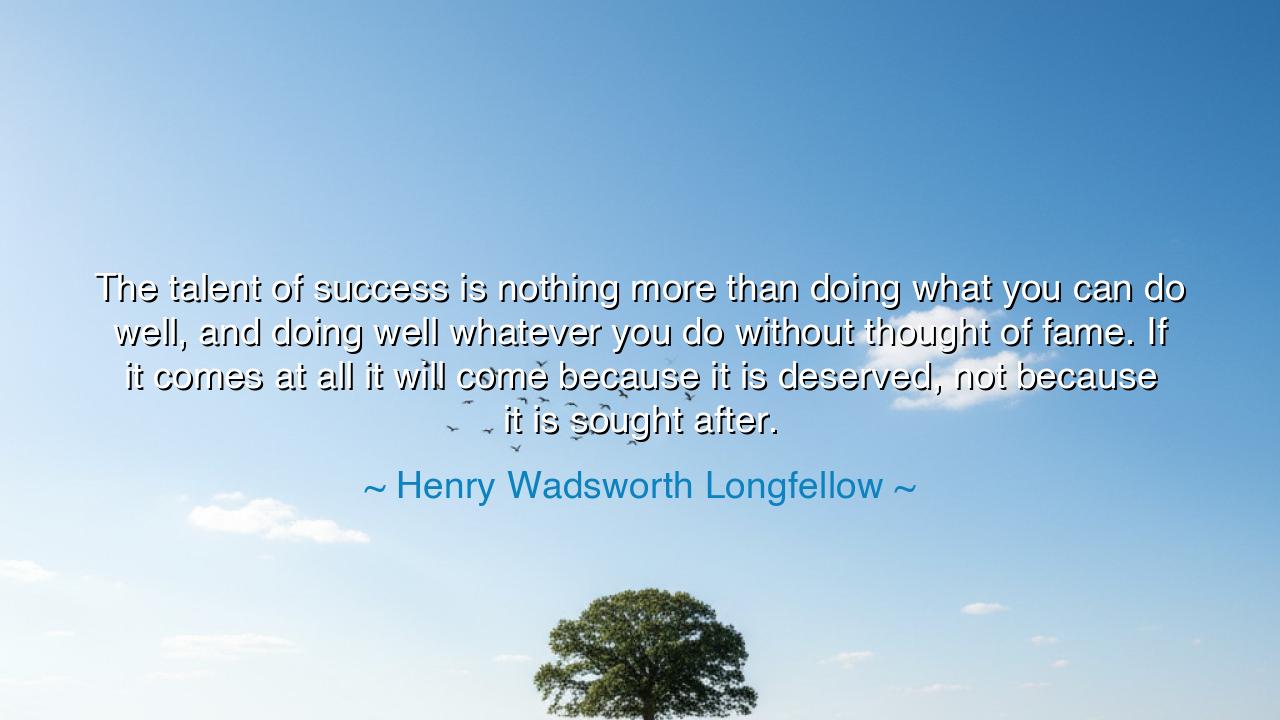
The talent of success is nothing more than doing what you can do
The talent of success is nothing more than doing what you can do well, and doing well whatever you do without thought of fame. If it comes at all it will come because it is deserved, not because it is sought after.






Hear the noble wisdom of Henry Wadsworth Longfellow, poet of the American soul, who declared: “The talent of success is nothing more than doing what you can do well, and doing well whatever you do without thought of fame. If it comes at all it will come because it is deserved, not because it is sought after.” In these words he lays bare the eternal law of labor and reward: that true greatness is not born from the hunger for applause, but from the honest devotion to one’s craft.
The talent of success is not some mystical gift, hidden in the blood of kings or bestowed by fate upon a chosen few. It is the discipline to do what lies before you with excellence, however humble the task may seem. The farmer tilling the soil, the craftsman carving wood, the teacher guiding a child—each can embody this talent if they labor with care, with pride, and with devotion to quality rather than recognition. For Longfellow knew that success is not about spectacle, but about integrity.
And he warns us of the poison of fame. To chase fame for its own sake is to build upon sand, for fame is fickle and fleeting, turning quickly from praise to scorn. Those who seek only to be seen often lose themselves in vanity and hollow gestures. But those who work without thought of fame, who pour themselves into their calling with purity of intent, may find that recognition arrives of its own accord—and when it does, it is no accident, but the natural fruit of merit. Deserved, not demanded.
History shines with examples. Consider Florence Nightingale, who did not pursue glory but sought only to heal the sick and ease the suffering of soldiers. She toiled in filth and disease, not in pursuit of applause, but in the quiet resolve to do what must be done, and to do it well. Yet from this labor, unadorned and unsought, came lasting success: she became a legend of compassion, her name honored through the centuries. Her fame came not because she craved it, but because she had earned it.
So too did Albert Einstein embody this truth. He did not begin with the ambition of becoming the most celebrated physicist of his age. He worked in a patent office, scribbling theories in obscurity, driven only by the desire to understand the mysteries of nature. He did what he could do well, and he did it faithfully. And when the world discovered his genius, his success and his fame followed—not because he had sought them, but because his work was too powerful to remain hidden.
The deeper wisdom here is that we must anchor our lives not in the pursuit of recognition, but in the pursuit of mastery and authenticity. The world may notice, or it may not; but if we work well, if we live well, then we have already achieved the truest form of success. For in the eyes of eternity, it is not the applause of the crowd that matters, but the quiet knowledge that we have done what was ours to do, and done it with excellence.
So, O children of tomorrow, take Longfellow’s words into your heart. Do not ask, “Will the world see me?” Ask instead, “Am I faithful to my gift? Am I doing well the work that lies in my hands?” Trust that if fame should come, it will come because it is deserved, not because it is chased. And even if it never arrives, you will have built a life of substance, a legacy of integrity. This is the true talent of success: to labor honestly, to live authentically, and to let the rest follow as it may.






AAdministratorAdministrator
Welcome, honored guests. Please leave a comment, we will respond soon